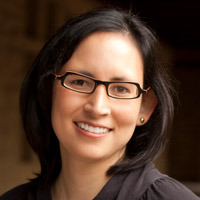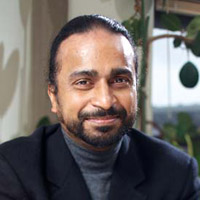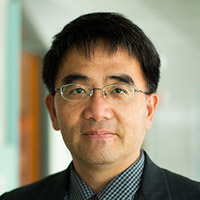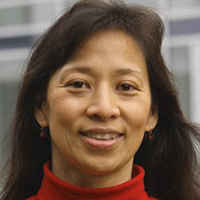Morning Plenary Talk

Wednesday, October 9
Allison Okamura
Professor, Department of Mechanical Engineering
Stanford University
Title: Soft Robots for Humanity
Abstract: While traditional robotic manipulators are constructed from rigid links and simple joints, a new generation of robotic devices are soft, using flexible, deformable materials. The growing field of soft robotics offers exciting new approaches for bio-inspired design, fast and low-cost prototyping, and integrating novel materials with digital control. These soft robots have the potential to benefit humanity in a wide variety of applications, ranging from medical devices that interface gently with the human body to robot explorers for remote or dangerous environments. Yet, soft robots face many challenges toward implementation in the real world, including practical actuation, physical robustness, and reliable control. This talk will describe several robotic systems that leverage softness to achieve novel shape control, provide a compliant interface to the human body, and access hard-to-reach locations. Knowing when to exploit and when to alter some of the inherent consequences of softness is key to making soft robots that can be deployed to benefit human health, safety, and quality of life.
Biography: Allison M. Okamura received the BS degree from the University of California at Berkeley and the MS and PhD degrees from Stanford University, all in mechanical engineering. She is currently Professor in the mechanical engineering department at Stanford University, with a courtesy appointment in computer science. She is an IEEE Fellow and Editor-in-Chief of the journal IEEE Robotics and Automation Letters. Her awards include the 2016 Duca Family University Fellow in Undergraduate Education, 2009 IEEE Technical Committee on Haptics Early Career Award, 2005 IEEE Robotics and Automation Society Early Academic Career Award, and 2004 NSF CAREER Award. Her academic interests include haptics, teleoperation, virtual environments and simulators, medical robotics, neuromechanics and rehabilitation, prosthetics, and engineering education. Outside academia, she enjoys spending time with her husband and two children, running, and playing ice hockey. For more information about her research, please see the CHARM Laboratory website.
Morning Plenary Talk

Thursday, October 19
Santosh Devasia
Professor, Department of Mechanical Engineering
University of Washington
Title: Cohesive Networks using Delayed Self-Reinforcement
Abstract: Synchronization is important in many multi-agent networks including velocity synchronization to maintain inter-vehicle spacing in connected automated transportation systems, alignment synchronization to help maintain formations during maneuvers of flocks and swarms in nature, and maintaining formation of engineered networks such as satellites, unmanned autonomous vehicles and collaborative robots. While current network theories focus on the use of neighbor-based distributed strategies for asymptotic synchronization of the overall response, it is more challenging to maintain cohesion of the responses during rapid network maneuvers. This is because information about the desired response (such as the desired orientation or speed of the agents) might be available to only a few agents. The desired-response information needs to be propagated through the network to other agents, which results in response-time delays between agents that are “close to” the information source and those that are “farther away.” The talk will present a delayed self-reinforcement (DSR) approach, where each individual augments its neighbor-based information update using its previously available updates, to (i) increase the information-transfer rate without requiring an increased, individual update-rate; (ii) enable superfluid-like information transfer seen in biological systems; and (iii) improve cohesiveness of the response during transitions. Such improvements can enable better understanding of cohesiveness of flocking in nature, as well as improve the performance of engineered swarms such as unmanned mobile systems.
Biography: Santosh Devasia received the B.Tech. (Hons) from the Indian Institute of Technology, Kharagpur, India, in 1988, and the M.S. and Ph.D. degrees in Mechanical Engineering (ME) from the University of California at Santa Barbara in 1990 and 1993 respectively. He is the Director of the Boeing Advanced Research Center (BARC) at the University of Washington (UW) and a Professor of Mechanical Engineering at the UW, Seattle where he joined in 2000 after teaching from 1994 to 2000 in the ME Department at the University of Utah, Salt Lake City. He served as the Associate Chair of the ME Department at UW from 2010-2013, and as the Associate Dean of Research and Faculty Affairs in the College of Engineering at UW from 2013-2017. He is the General Chair for the 2020 American Control Conference and the 2023 Advanced Intelligent Mechatronics Conference. He is a fellow of ASME and IEEE. His current research interests include control of multi-agent systems and precision human-machine systems. Additional details of current efforts can be found here.
Oldenburger Lecture

Thursday, October 10, evening
Professor Huei Peng
Roger L. McCarthy Professor of Mechanical Engineering
University of Michigan
Title: Perfect Storm—Time to Rethink the Future of Control Research and Education
Abstract: Automatic Control is a relatively new field and has been my core discipline, and what I practice every day for more than 30 years. Increasingly, it feels to me that it is time for us to have a serious discussion about the future of “Controls”, in terms of how we define and teach its core knowledge and how we best apply what we know to solve impactful research problems. There are several external factors that seem to impact our field of discipline at this very moment. One is the rapid rising of “data-driven” and “computation-driven” tools and methods, including deep-neural-network and reinforcement learning. These methods are quite different from the traditional dynamic modeling, and subsequent “model-based” analysis and synthesis methodologies that dominate what we teach in undergraduate and graduate control courses. Another mega-trend is that many “grand challenge” problems emerge and need to be solved quickly, including climate change, clean energy, etc. Due to the urgency and multi-disciplinary nature of these problems, the cry for “problem-centric” research vs. “domain-centric” research is stronger and Federal funding seems to be shifting very quickly. We need to think carefully how to best-preparing our students to be ready to take on these grand challenges. The evolution of my research areas and some preliminary experience and thoughts will be presented in this talk.
Biography: Huei Peng received his Ph.D. in Mechanical Engineering from the University of California, Berkeley in 1992. He is now a Professor at the Department of Mechanical Engineering at the University of Michigan. He currently serves as the Director of Mcity, which studies connected and autonomous vehicle technologies and promotes their deployment. His research interests include adaptive control and optimal control, with emphasis on their applications to vehicular and transportation systems. His current research focuses include design and control of electrified vehicles, and connected/automated vehicles.
In the last 10 years, he was involved in the design of several military and civilian concept vehicles, including FTTS, FMTV, Eaton/Fedex, and Super-HUMMWV—for both electric and hydraulic hybrid concepts. He served as the US Director of the DOE sponsored Clean Energy Research Center—Clean Vehicle Consortium, which supports more than 30 research projects related to the development of clean vehicles in the US and in China.
He has served as the PI or co-PI of more than 50 research projects, with a total funding of more than 55 million dollars. He has more than 300 technical publications, including 150 in referred journals and transactions and four books. His h-index is 74 according to the Google scholar analysis. The total number of citations to his work is more than 21,000. He believes in setting high expectation and helping students to exceed it by selecting innovative research topics with high impact. One of his proudest achievements is that more than half of his Ph.D. students have each published at least one paper cited more than 100 times.
Huei Peng has been an active member of the Society of Automotive Engineers (SAE) and the American Society of Mechanical Engineers (ASME). He is both an SAE fellow and an ASME Fellow.
He is a ChangJiang Scholar at the Tsinghua University of China.
Nyquist Lecture

Friday morning, October 11
Professor Lucy Pao
Palmer Endowed Chair Professor
Electrical, Computer, and Energy Engineering Department
University of Colorado Boulder
Title: Design and Control of Extreme-Scale Wind Turbines
Abstract: Wind energy is recognized worldwide as cost-effective and environmentally friendly and is among the fastest-growing sources of electrical energy. To further decrease the cost of wind energy, wind turbines are being designed at ever larger scales, which is challenging due to greater structural loads and deflections. Large-scale systems such as modern wind turbines increasingly require a control co-design approach, whereby the system design and control design are performed in a more integrated fashion. We will overview a two-bladed downwind morphing rotor concept that is expected to lower the cost of energy at wind turbine sizes beyond 13 MW compared to continued upscaling of traditional three-bladed upwind rotor designs. We will describe an aero-structural-control co-design process that we have used in designing such extreme-scale wind turbines. We will also highlight some of the control systems issues for wind turbines at these scales and outline selected advanced control methods we are developing to address these issues. We shall close by discussing continuing challenges and on-going and future research avenues that can further facilitate the growth of wind energy.
Biography: Lucy Pao is the Palmer Endowed Chair Professor in the Electrical, Computer, and Energy Engineering Department at the University of Colorado Boulder. She earned B.S., M.S., and Ph.D. degrees in Electrical Engineering from Stanford University. Her research has primarily focused on engineering control systems, with applications ranging from atomic force microscopes to multi-megawatt wind energy systems. She is a Fellow of the IEEE and the International Federation of Automatic Control (IFAC). Selected recent awards include the 2012 IEEE Control Systems Magazine Outstanding Paper Award (with K. Johnson), the 2015 Society for Industrial and Applied Mathematics (SIAM) Journal on Control and Optimization Best Paper Prize (with J. Marden and H. P. Young), the 2017 Control Engineering Practice Award from the American Automatic Control Council, and the Scientific Award 2017 from the European Academy of Wind Energy. Selected recent and current professional society activities include being a Fellow of the Renewable and Sustainable Energy Institute (2009-present), General Chair of the 2013 American Control Conference, member of the IEEE Control Systems Society (CSS) Board of Governors (2011-2013 and 2015), IEEE CSS Fellow Nominations Chair (2016-2018), member of the IFAC Fellow Selection Committee (2014-2017 and 2017-2020), and member of the IFAC Executive Board (2017-2020).